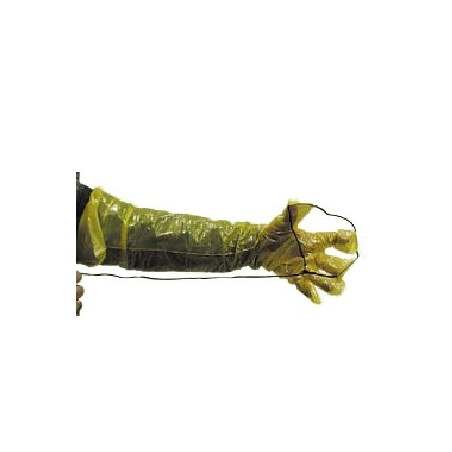At weaning, the pig is subjected to an array of stressors of nutritional, environmental and social origin. These stressors have been shown to be associated with reduced growth rates, changes in the gut morphology and a change in the microbial populations in the gut, leading to increased susceptibility to scouring and disease. In the past, these problems have been managed in a controlled fashion by the use of prophylactic antibiotics.
Recently seaweeds and sea weed extracts (SWE) have been researched as an alternative to in-feed antibiotics in pig diets (Gardiner et al., 2008; Reilly et al., 2008; Gahan et al., 2009). Seaweeds are rich in undigestible polysaccharides and are a potential source of soluble dietary fibers. The most abundant polysaccharides in brown seaweeds are laminarin, fucoidan and alginic acid. Lynch et al. (2010) showed that laminarin had antimicrobial properties while Deville et al. (2007) noted that laminarin can influence the adherence and the translocation of bacteria across the epithelial wall and seems to be a modulator of the intestinal metabolism by its effects on mucus composition, intestinal pH and short-chain fatty acid production, especially butyrate. Fucoidans are sulphated polysaccharides extracted from the cell wall of various species of brown seaweeds. Fucoidans have been shown to have antitumor, antiviral and antibacterial properties.

Gardiner et al. (2008) reported linear decreases in daily gain as the level of the Ascophyllum nodosum extract increased, in healthy grower-finisher pigs. However, this extract also contained phenolic compounds and alginates and led the authors to conclude that unless the process of extraction removed these components, its use as a commercial feed additive would be limited. As a result of this work, O’Doherty et al. (2010) showed that the inclusion of a laminarin and fucoidan extract only increased both daily gain (+11%) and feed efficiency in post weaned pigs. Similar responses in growth rate and feed efficiency have been reported by McDonnell et al., (2010) with laminarin.
This improved performance may be attributable to a number of reasons. First, there is a reduction in E. coli numbers in the gut of the laminarin and fucoidan extract-fed pigs. The inclusion of the SWE decreased the counts of E. coli in the faeces compared with non SWE diets. Similarly, McDonnell et al. (2010) demonstrated that the inclusion of a laminarin extract had an inhibitory effect on the counts of E. coli in weaner pigs. The decrease in E. coli numbers as a result of laminarin and fucoidan inclusion was particularly evident in pig health between days 7-14 post weaning.
Second, the supplementation of laminarin and fucoidan extract increased the nutrient digestibility of the diets compared with the non-SWE diets. Little research has been conducted regarding the effects of SWE on digestibility or gut physiology in pigs. The increased digestibility may be due to the increase in the Lactobacilli spp. numbers observed with the SWE fed pigs. The SWE increased the numbers of lactic acid bacteria. These bacteria have an ability to produce a wide range of cell-associated polysaccharide depolymerases and glycosidases which may aid in nutrient digestion, and in particular will aid in the degradation of plant cell wall structural polysaccharides. It has also been reported that SWE may influence nutrient digestibility by maintaining the function and structure of the small intestine, leading to an increased digestive capacity of the gut (Reilly et al., 2008).
Immune response
As well as being considered as a source of dietary fibre in monogastric nutrition, laminarin also have distinctive immunomodulatory characteristics. There is, however, considerable variation in the biochemical and solubility characteristics of β-glucans and laminarin from different sources. Recently Sweeney et al., (2012) showed that the expression of a panel of pro-and anti-inflammaory cytokines (IL-1, TNF-α and IL-17A) was down regulated in the colon following exposure to laminarin but had no effect in the ileum. Seaweed-derived polysaccharides are resistant to hydrolysis by digestive enzymes in the upper gastro-intestinal tract which may explain the lower expression of cytokine markers in the ileum compared to the colon of supplemented pigs. Dietary supplementation with laminarin at 600 ppm significantly increased MUC2 and MUC4 expression in the gut compared to a basal diet (Smith et al., 2011). This up-regulation is consistent with the protective role of mucins in the formation of a ‘gut barrier’, after mucosal stimulation by dietary fibres. Additionally, alteration in intestinal microbiota may also influence mucin synthesis and secretion as adherence of beneficial bacteria to mucosal epithelia stimulates up-regulation of colonic MUC2 expression in vivo and in vitro. Therefore, laminarin supplementation may have increased MUC2 and MUC4 expression indirectly by acting as a substrate for the resident microbiota, which in turn, up-regulates mucin production.
Overall, the reductions in E.coli populations and the increase in daily gain and gain to feed ratio suggest that sea weed extracts may provide a dietary means to improve gut health post weaning. However, the effects of seaweed extracts on piglet performance depends on the extraction process and the variety of seaweeds used.




